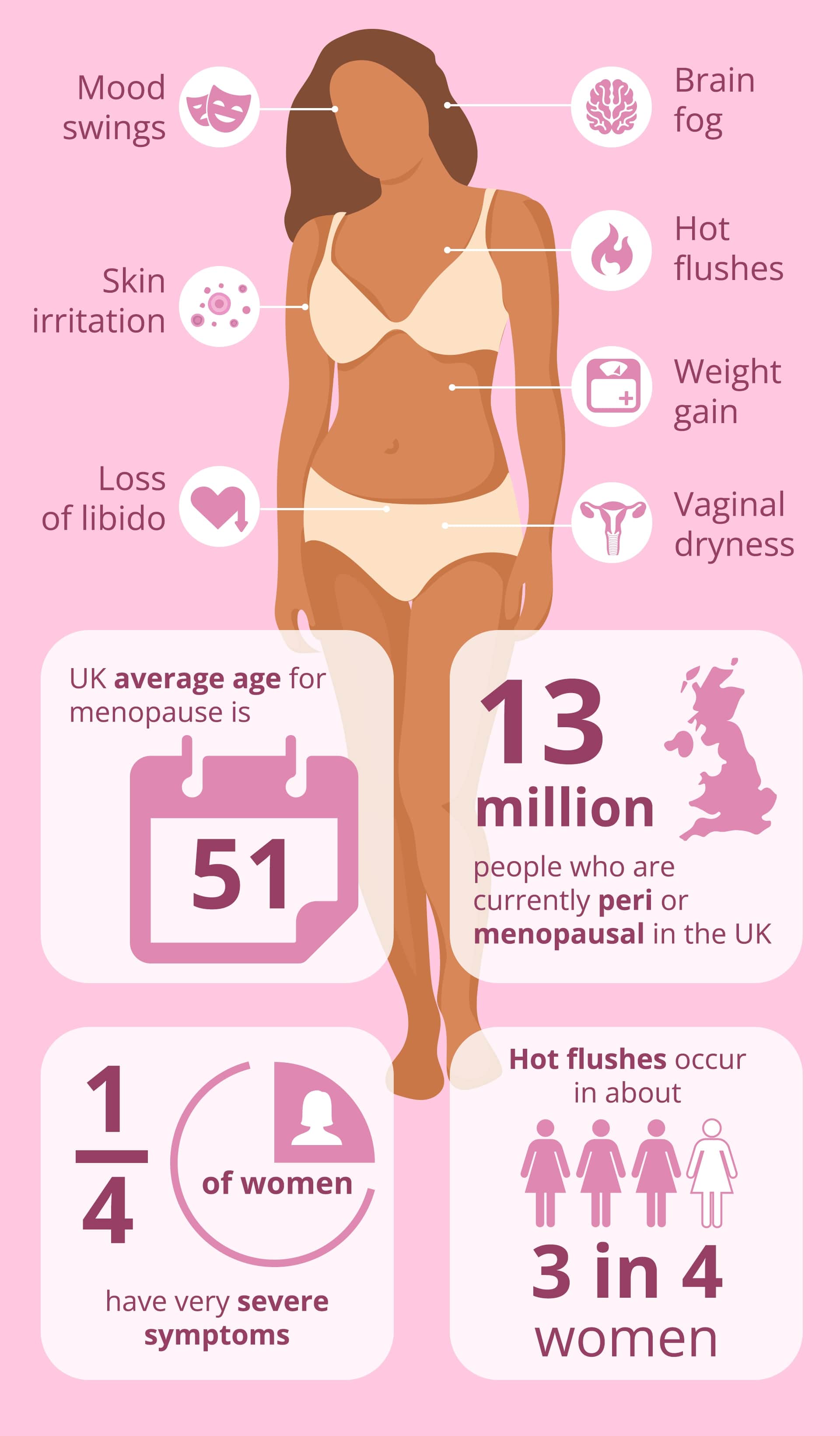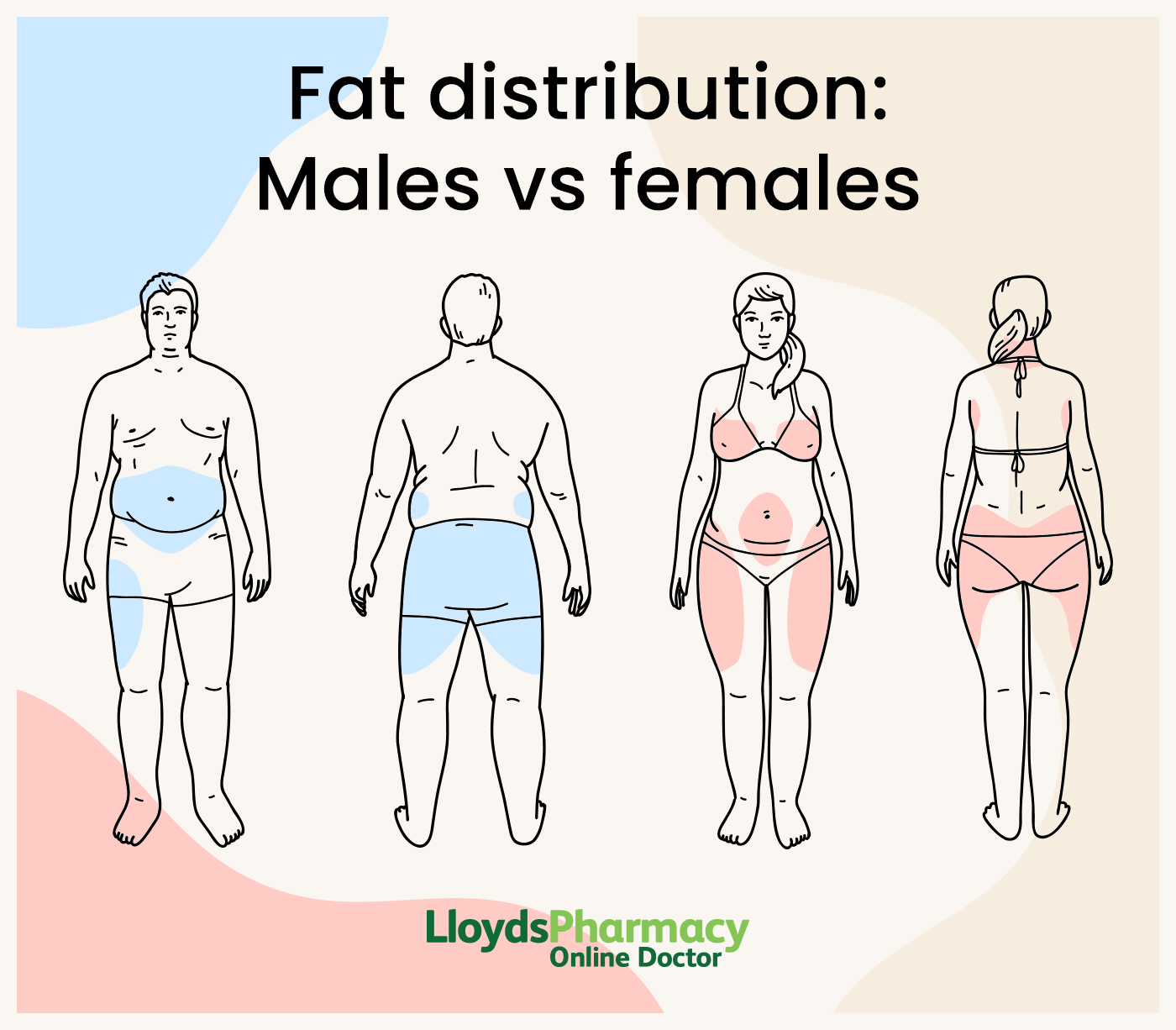Menopause and weight gain
Reviewed by Dr Bhavini Shah
The common symptoms of the menopause are hot flushes, night sweats, vaginal dryness, mood changes, and a loss of sex drive. However, some women also experience changes to their weight.
In this article we’ll explore why menopause causes weight gain and how you can lose weight during the menopause.
Does menopause cause weight gain?
Lots of women going through the menopause experience weight gain. The Menopause Society reports it as the most common side effect of the menopause, affecting 50% of women. On average women gain up to 10kg (1 and a half stone) by the time the menopause is reached.
Menopausal weight gain can be caused by:
- Muscle mass decreasing during menopause, which means that your body requires fewer calories. Failing to reduce your calorie intake may mean you end up eating more than you need and so put on weight.
- Changing hormone levels affect the way we store fat. During the menopause, your body will tend to store more calories than it burns, causing a build-up of fat.
- Menopause symptoms that indirectly affect your weight. If you’re experiencing night sweats and struggling to sleep, you may have less energy and find it harder to do regular exercise. This lack of activity is likely to lead to more weight gain.
- Taking HRT although there isn’t much evidence to link HRT and weight gain – some women may experience a bit of fluid retention.
Weight gain isn’t an inevitability for all women, although it may be harder to lose weight as you get older. There are plenty of easy changes you can make if you do experience weight gain during the menopause.

What does menopause belly look like?
Most of the weight gained during menopause sits around the upper body and waist. Some people call this the ‘menopause belly’. It’s common to experience a change in fat distribution and body shape leading up to and during menopause.
You may find you have more fat around your waist than you previously had. You may also experience bloating which can contribute to changing body shape.

What are the health risks associated with weight gain during menopause?
Any kind of significant weight gain comes with health risks. If you’re obese, you’re much more likely to develop serious conditions like type 2 diabetes and heart disease. You’re also more at-risk for certain types of cancer.
A specific health risk for menopausal women is that weight gain tends to occur around the middle. Fat storage in this area is associated with a higher risk of type 2 diabetes and heart attack. Being a healthy weight for you can help lower these risks.
How to lose menopausal weight
Around the menopause many women can put on weight. Body changes can affect your mental health, and how you feel about your body and yourself. If you’re wanting to lose weight setting goals, getting better sleep and getting support from friends and family can help.
Menopause diet tips
After the age of 40, our metabolic rate slows down, and after menopause we lose muscle mass. This means our bodies need fewer calories. Although, you don’t need to eat any specific foods during the menopause. There are some changes you can make to the way you eat, especially if you’re experiencing weight gain.
You could:
- Eating smaller portions
- Not overfilling your plate
- Eating more mindfully
- Stop eating after you’re full
- Try to cut back on salt, sugar, and saturated fat
- Try to do more home cooking rather than relying on takeaways or ready meals
- Be mindful of your intake of caffeine and alcohol, as these can worsen hot flushes and interfere with sleep
- Eat a healthy balanced diet
- Aim to get some dairy into your daily diet – good options are semi-skimmed milk, low-fat cheese, and low-fat plain yoghurt.
“Being hydrated increases our metabolic function, energy, and decreases hunger so there is a strong correlation between drinking enough water and actually losing weight.” - Dr. Sameer Sanghvi
Menopause exercise tips
Exercise is important no matter what your age or sex. If you’re menopausal and experiencing weight gain, you’ll want to make sure that you’re doing regular activity. This should include weight-bearing and resistance exercises as these will help to improve bone density and prevent osteoporosis.
Good exercises for menopausal women include:
- Brisk walking
- Dancing
- Aerobics or other fitness classes
- Lifting weights
If you’re new to regular exercise, start small and build up gradually. You’ll want to make sure you wear shoes that provide good support for your feet and ankles, and that you get proper guidance on form – especially when you’re lifting weights or doing resistance exercises like press-ups.
Remember too that any increase in exercise will have a positive effect and help you burn calories. Make some simple changes like taking the stairs, getting off the bus a stop early, and taking regular breaks from your desk chair to stretch and walk around.
Menopause weight loss treatments
There’s no weight loss treatment designed specifically for menopausal women. However, there are some weight loss treatments available that may be right for you:
- Mounjaro® - a weekly weight loss injection that can help people lose up to 21% of their body weight on the highest dose
- Wegovy® - a weekly injection that suppresses your appetite and helps 85% of people lose weight in clinical trials
- Orlistat/Xenical - weight loss pills which taken with a low-fat diet help you lose weight by stopping fat being absorbed
When to see a doctor
If you think you have perimenopause or are experiencing menopause symptoms speak to a doctor. These can include:
- Hot flushes
- Vaginal dryness
- Low mood, anxiety and mood changes
- Decreased sex drive
- Problems with concentration and memory
Your doctor can discuss treatment options and lifestyle changes that may help you.
Conclusion
Before and during the menopause you can experience a lot of bodily changes including weight gain. Healthy lifestyle changes such as exercising and eating a balanced diet can help.
References
www.nhs.uk/conditions/menopause
www.bda.uk.com/resource/menopause-diet.html
www.nhs.uk/conditions/obesity
https://patient.info/news-and-features/your-diet-and-the-menopause
www.nhs.uk/conditions/osteoporosis/prevention
https://thebms.org.uk/wp-content/uploads/2023/06/19-BMS-TfC-Menopause-Nutrition-and-Weight-Gain-JUNE2023-A.pdf





